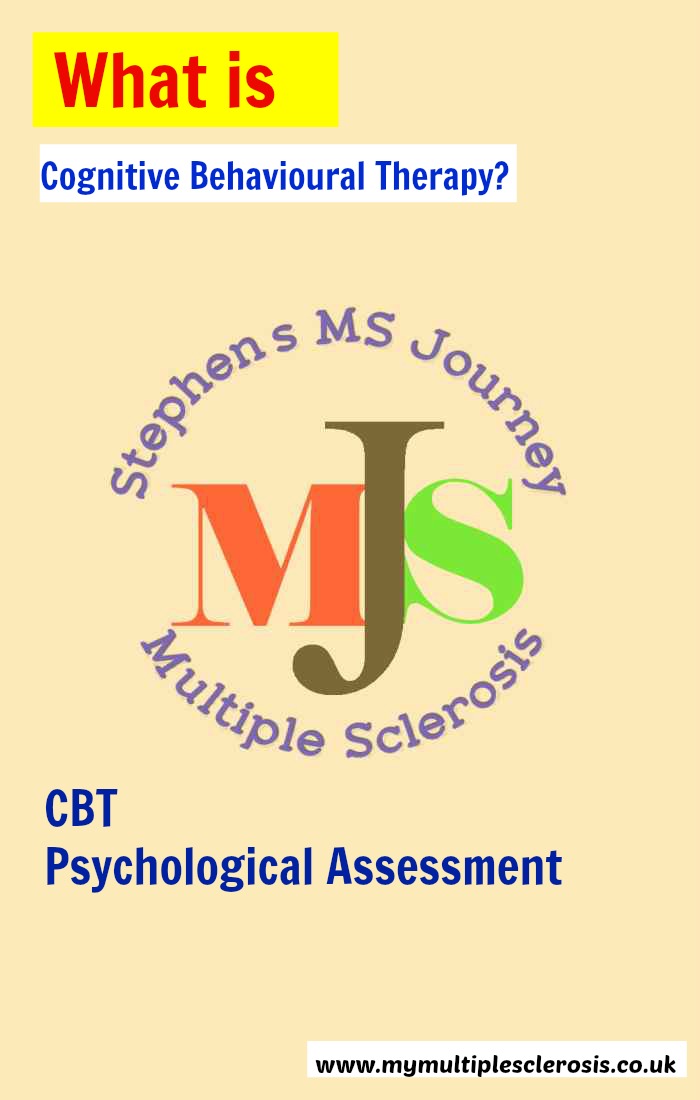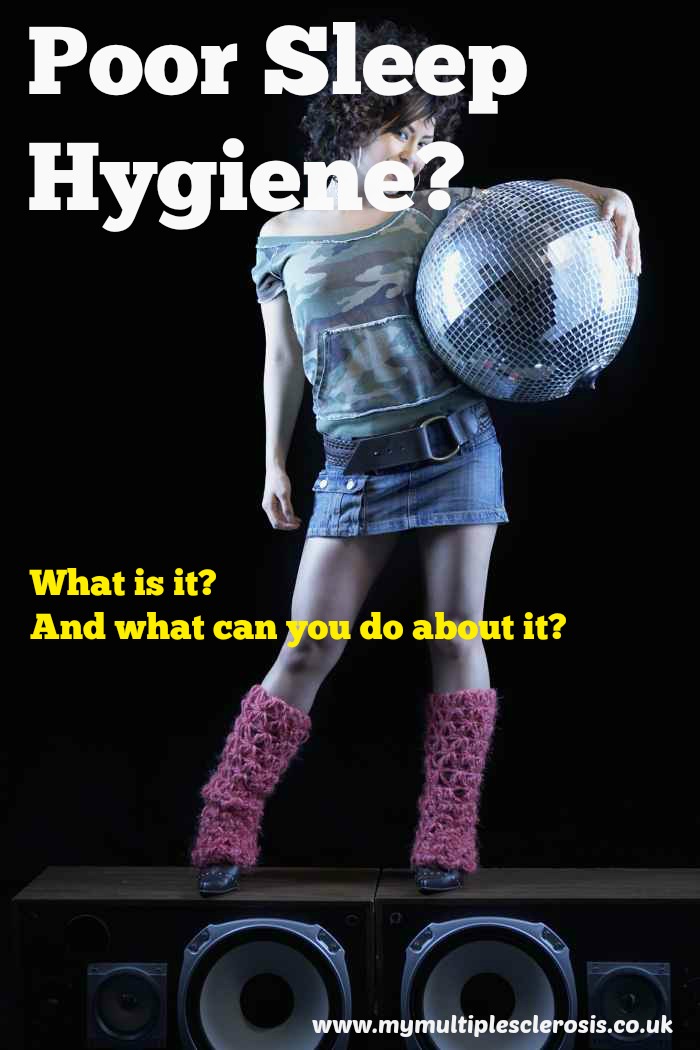 Cognitive Behavioural Therapy a type of psychotherapy in which negative patterns of thought about the self and the world are challenged in order to alter unwanted behaviour patterns or treat mood disorders such as depression.
Cognitive Behavioural Therapy a type of psychotherapy in which negative patterns of thought about the self and the world are challenged in order to alter unwanted behaviour patterns or treat mood disorders such as depression.
I began to investigate this subject as part of my research into poor sleep quality and because I have been referred to a psychologist to assess my cognitive abilities because I have expressed concerns to my neurologist about my MS brain fog.
The NHS Choices web site has a detailed page explaining what cognitive behavioural therapy, or CBT, is, how it works and what conditions it may be used for.
Psychologist Assessment
At my first meeting with the psychologist we discussed very little. She asked me what I wanted her to do. I asked her what she thought she could do. Something of a stalemate.
She suggested that we schedule a number of meetings where she would assess my thinking abilities. This assessment would be done over a number of weeks and she stressed that it would be an arduous test.
At the time of writing, I have had two of these meetings and they have been demanding. They appear to have focused on memory ability; short-term recall as well as longer-term memory.
There have been a few tests of logic and reasoning, but they have been very simple and not too tasking.
Cognitive Behavioural Therapy What is it.
NHS Choices tells us that cognitive behavioural therapy is a talking therapy that can help you manage your problems by changing the way you think and behave.
Psychology is something of a dark art as far as I am concerned. A little knowledge is a dangerous thing. An expression I am sure that many of us has heard before. My psychologist has told me off, in a friendly manner, for trying to analyse what she is doing.
I am sure this assessment is more than just an evaluation Yes the memory tests and the logic puzzles assess my thinking function but, it is also intended to encourage me speak.
And, as soon as you speak, no matter how guarded you think you are being, you are revealing the inner you. Many of us are wary of being too open about our inner thoughts.
Uses for CBT
CBT has been shown to be an effective way of treating a number of different mental health conditions.
In addition to depression or anxiety disorders, CBT can also help people with:
- obsessive compulsive disorder (OCD)
- panic disorder
- post-traumatic stress disorder (PTSD)
- phobias
- eating disorders – such as anorexia and bulimia
- sleep problems – such as insomnia
- problems related to alcohol misuse
CBT is also sometimes used to treat people with long-term health conditions, such as:
- irritable bowel syndrome (IBS)
- chronic fatigue syndrome (CFS)
Although CBT can’t cure the physical symptoms of these conditions, it can help people cope better with their symptoms.
Only two of these problems resonate with me; Sleep problems and Chronic Fatigue Syndrome.
Now, I am a great believer in the power of the mind. If you think you are getting better, REALLY THINK you are getting better then you have every chance that you will recover.
The only fly in the ointment of this belief, is that if the power of the mind can cure, then it must have been something in the mind that caused the problem in the first place.
Poor Sleep Hygiene

No, not sleeping in a dirty bed but, adopting habits that are not conducive to good sleep. Poor sleep hygiene is watching TV, reading from your smartphone or playing games on your tablet.
I include this topic alongside the cognitive behaviour as it was the sleep problems that had instigated my research in the beginning.
I have long known that electronic devices can inhibit sleep. This however, does not always mean I alter my behaviour in the appropriate way.
I like to read as a method of winding-down at the end of the day. Reading is generally a good way to relax and lull yourself to sleep and I like to read from my Kindle. I am reading the Complete Works of Charles Dickens, which I have been doing for several years.
If I was to have this in hard copy, it would be many volumes of reading matter. So, the Kindle version is so much more convenient and manageable.
I have one of the early model Kindles. It does not have a back-lit screen so should not over-excite the visual cortex.
Good Sleep Hygiene
The National Sleep Foundation has an interesting article on what it considers to be good sleep hygiene. And I guess it is better to focus on what is good rather than what is bad.
It lists a number of factors consider to be good sleep hygiene:
- Avoid napping during the day. It can disturb the normal pattern of sleep and wakefulness.
- Avoid stimulants such as caffeine, nicotine, and alcohol too close to bedtime. Alcohol can be good for putting you to sleep but it will not produce good, restful sleep.
- Exercise can promote good sleep. Exercise can be good for sleep when done at the right time of day
- Food can be disruptive right before sleep. Stay away from large meals close to bedtime.
- Ensure adequate exposure to natural light. This is particularly important for older people who may not venture outside as frequently as children and adults. Light exposure helps maintain a healthy sleep-wake cycle.
- Establish a regular relaxing bedtime routine. Try to avoid emotionally upsetting conversations and activities before trying to go to sleep. Don’t dwell on, or bring your problems to bed.
- Associate your bed with sleep. It’s not a good idea to use your bed to watch TV, listen to the radio, or read.
- Make sure that the sleep environment is pleasant and relaxing. The bed should be comfortable, the room should not be too hot or cold, or too bright.
I agree with many, if not all, of these points. If you eat late in the evening, it disrupts your circadian rhythms and can cause huge spike in blood sugar levels.
I, personally, have long avoided drinking coffee in the afternoon or evening. I avoid drinking alcohol on all but very rare occasions and I try not to eat after 5pm.
Adopting Good Sleep Practice
But, surprisingly, the habit I have adopted that has helped most is learning a foreign language. Learning a new language can have many benefits. More than, making ordering food easier when on holiday, is promotes the development of new brain cells to improve cognitive function which will aid sleep.
I have started listening to my Spanish language CDs in bed with the lights out. This has the benefit of both subliminal learning and sleep promotion listening to the drone of the language teacher.
Not, perhaps, a vote of confidence for the language teacher but, I have had many good nights of sleep since I started this routine.
In addition, I have been able to reduce the dosage of my temazepam from 20mg to 10mg. This is a good thing and, long overdue. Temazapam is an addictive drug and I have been using it for over two years.
Over to You on on Cognitive Behavioural Therapy and Poor Sleep Hygiene
As ever, I conclude this post with an invitation for you to comment. If any of the information I have provided is erroneous or you have something to add, please leave a comment so that our visitors feel involved in the discussion.
